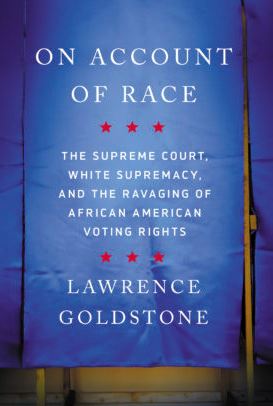
On Account of Race: The Supreme Court, White Supremacy, and the Ravaging of African American Voting Rights by Lawrence Goldstone. Berkeley, California: Counterpoint, 2020.
In this well-documented book, Lawrence Goldstone describes post-Civil War efforts to reverse many of the rights gained by African Americans through the 13th, 14th, and 15th amendments. While many former Confederates remained opposed to the rights of Blacks, Goldstone details the demoralizing erosion of rights for the Freedmen that resulted from governmental and non-governmental actions. Most disconcerting is the role that the U.S. Supreme Court played in the process. In a series of decisions the Supreme Court laid “the groundwork for taking back from black people almost every right of citizenship that had been promised to them by the nation that had enslaved them.” (page 78) Using many primary sources to describe the post-Civil War social, political, and legal climate, Goldstone weaves a theme highlighting the erosion of voting rights for Blacks.
The post-President Grant era saw a shift in political power, and Republicans began opposing integration efforts despite the passage of the 1875 Civil Rights Act which was supposed to enforce equality as defined in the 14th amendment. The Act provided for equal enjoyment of accommodations, public conveyancers, and other social amenities. Ultimately, the expansion of rights for Black citizens that encouraged integration into mainstream life created fear and resistance with many White voters. These fears even existed among people who once favored Black suffrage. Consequently, implementing integration policies drove many hesitant White businesses to exclude Black customers, despite the imposition of fines for violators. In both the North and the South, voting registrars ignored the law and denied Blacks the right to vote.
The erosion of rights for Black Americans failed to garner attention in the federal courts. The Supreme Court remained idle for several years and failed to hear any appeals of federal cases related to equal rights until 1875. In U.S. v. Reese, 92 U.S. 214 (1875), the defendant refused to accept the poll tax from William Garner, a person of African descent, thereby prohibiting him from voting. The question before the Court was whether the Enforcement Act of 1870 was a valid exercise of Congress’ power to enforce the 15th amendment. The Court concluded that the amendment didn’t confer the right to vote, but it rather criminalized the denial of the right to vote based on race. However, there was no legislation defining the punishment, consequently the defendants remained unaccountable:
We must, therefore, decide that Congress has not as yet provided by ‘appropriate legislation’ for the punishment of the offence charged in the indictment; and that the Circuit Court properly sustained the demurrers, and gave judgment for the defendants. Reese, 92 U.S. at 221.
Interestingly, the case, which originated in Kentucky, was prosecuted by John Marshall Harlan, a Republican and former slaveholder, who became a U.S. Supreme Court Justice in 1877. In 1896, Justice Harlan was the lone dissenting voice in Plessy v. Ferguson, 163 U.S. 537 (1896).
Goldstone also describes a shadow government, or “the Invisible Empire” (page 48) that was the Ku Klux Klan. He explains that the Ku Klux Klan began when six young Confederate veterans began targeting Black people. These activities evolved into more terrifying tactics that ultimately impacted elections when Black voters became fearful of the Klan and were discouraged from voting. In areas where they were not deterred by the presence of the U.S. Army, the shadow government kept newly-freed Black citizens from exercising their voting rights through fear and intimidation.
While Goldstone’s narrative focuses on the post-Civil War era, he also highlighted modern efforts. The 1965 Voting Rights Act signed by President Johnson banned tactics used in the South to deny people of color the right to vote, and Goldstone claims that the law was successful in getting increased numbers of African Americans to vote. It begs the question as to why its passage took 100 years after the Civil War. However, Goldstone also describes the 2013 Supreme Court case Shelby County Alabama v. Holder, 570 U.S. 529 (2013) which is construed by many as an anti-voting rights case pertaining to provisions of the Voting Rights Act of 1965. A more perplexing (albeit political) question is the Court’s affirmation of measures to weaken voting rights that have taken so long to attain in the first place.
The book is available for loan from the Ramsey County Law Library.